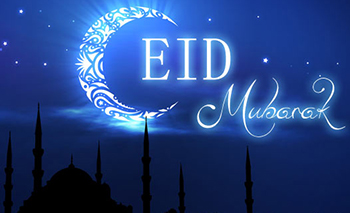
Eid-ul-Fitr
 Ramzan or Id-ul-Fitr is celebrated on the 1st of 'Shawaal', tenth lunar month of the Islamic calendar immediately after the month of Ramadan.The 'festival of fast breaking' is the most celebratory of all Muslim festivals. The term 'Eid' has been derived from the Arabic word 'oud', which means 'the return' and hence, signifies the return of the festival each year. The festival is significant as much for its timing, as for its religious implications. It is celebrated after the long fasting month of Ramadan (the ninth month of the Islamic calendar), on the first day of the Shawwal month of the Hijri year (Islamic calendar). Legend says that the Qur'an was revealed to Prophet Mohammed in the last ten days of Ramadan. Eid is a three-day long celebration that reaffirms the ideals of piety, empathy, charity and solidarity among Muslims all over the world. It is celebrated with tremendous enthusiasm and affection.
Ramzan or Id-ul-Fitr is celebrated on the 1st of 'Shawaal', tenth lunar month of the Islamic calendar immediately after the month of Ramadan.The 'festival of fast breaking' is the most celebratory of all Muslim festivals. The term 'Eid' has been derived from the Arabic word 'oud', which means 'the return' and hence, signifies the return of the festival each year. The festival is significant as much for its timing, as for its religious implications. It is celebrated after the long fasting month of Ramadan (the ninth month of the Islamic calendar), on the first day of the Shawwal month of the Hijri year (Islamic calendar). Legend says that the Qur'an was revealed to Prophet Mohammed in the last ten days of Ramadan. Eid is a three-day long celebration that reaffirms the ideals of piety, empathy, charity and solidarity among Muslims all over the world. It is celebrated with tremendous enthusiasm and affection.
The importance of Eid-ul-Fitr is associated with an actual event in the history of Islam. Allah sent an angel to reveal his words over a period of 23 years. These teachings formed the Holy Quran. Following the successful completion of the month of Ramadan, Eid-ul-Fitr becomes a great occasion to thank Allah for giving believers the will-power and endurance to observe the month-long fast and follow rules in personal conduct. It is also a time to renew one's faith in Allah and seek his blessings. The Islamic practice of giving 'zakat' is also upheld during this time. Just before Eid, Muslims part with some portion of their earnings and grains for the poor, so that they too can celebrate Eid with full fervour.
On this fortunate day of Eid-ul-Fitr festival, morning prayers are followed by a sermon and a congregational prayer at the mosque. Muslims offer Eid prayer 'Do Rakat Namaz' on this day. Then, dressed in new clothes they proceed to greet their family, relatives and friends 'Eid Mubarak'. This is done through friendly embraces and handshakes, as good gestures of unity. The ritual of distributing alms on this day is observed throughout the ongoing celebrations.
Eid-ul-Fitr Celebrations
Men typically wear white clothes that stand for purity while women and children are attired in especially tailored, bright-coloured clothes. Children also receive gifts or money by relatives. The festival is also associated with extravagant and lavish decorations, dinner parties and enjoyment. Muslim families host gatherings of and relatives, friends and neighbors and serve them sumptuous meals. The festive meals comprise a lavish spread of dishes along with the popular milk-based sweet preparation called 'seviyan'. The spirit of Eid transcends community and religious barriers, and the sight of even non-Muslims partaking of Eid celebrations is a common one.
Great importance is attached to Eid-ul-Fitr in India, as it is an important public holiday. All schools, colleges and public institutions remain closed to mark the significance of this day. Also, there exists a considerably large population of the Muslim minority, which adds to the cultural demographics of India. With time, these traditions have strengthened their interaction and intermingling with the Indian culture. Eid-ul-Fitr has, thus, seeped into India's cultural milieu and is looked forward to by everyone.
Source: Internet
Eid Mubarak!
Quote for the day
"A man is not old until regrets take the place of dreams."
- John Barrymore
|
|
| Campus Buzz is the daily e-Newsletter of Sahyadri Educational Institutions |
|
|
